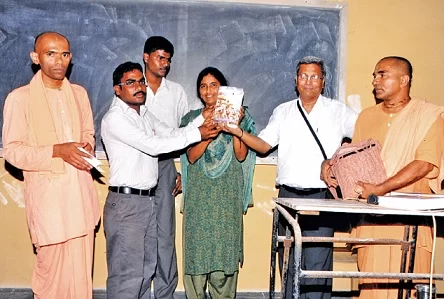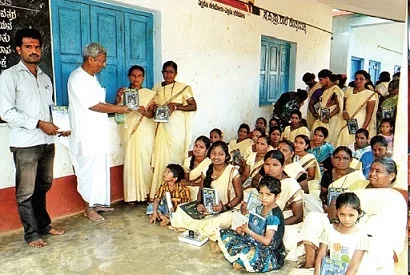
Another major obstacle was the so-called secular approach of Indian intellectuals. Promoting Bhagavadgita was considered communal, and the teachings of Bhagavad-gita were misunderstood as sectarian that addressed only a particular class of people. “In Urdu schools, they promote the teachings of Koran,” Divya Simha argued, “and in Christian schools the children are taught from the Bible. What is the harm if certain schools teach from the Bhagavad-gita?”
His persistent efforts finally convinced one BEO, who agreed to keep copies of Bhagavad-gita in 100 government school libraries. Soon other BEOs followed, and in the next four years, 1609 school libraries of Uttara Kannada received copies of this transcendental literature.
Besides school libraries, Divya Simha successfully placed copies of Bhagavad-gita and other Srila Prabhupada’s books in 220 Gram Panchayat libraries and in the library of Indian naval base in Karwar, Karnataka. Srila Prabhupada used to say that if a person read one verse or even half a verse of the Bhagavad-gita, he would derive great benefit, and the doors of liberation will fling wide open for him. Divya Simha continues to strive tirelessly to fulfill Lord Caitanya’s vision of taking Krishna consciousness to every town and village.
Other Achievements
For the last several years, Divya Simha is involved in a project called Hare Krishna Vana Mahotsava, where he distributes fruit trees to poor villagers. “If every villager has a mango, jackfruit, lemon and other fruit-bearing trees, they can easily earn Rs. 100,000 every year,” he explains.
As part of rural development, he is trying to ensure that every family in a village has a cow, which can provide excellent manure in the form of cow dung and cow urine. He also wants to ensure that every home has a toilet, so village women do not have to face any inconvenience.
In his native village of Madiangadi, he is teaching the villagers the traditional art of organic farming. Vishnu Naik from his village, expressing his gratitude to Divya Simha , recalls, “Six years ago, I had three cows. After taking up organic farming, my farm production has increased by 50 per cent. Today I own 24 cows, and I make more money by selling compost.” Naik’s success has inspired many villagers to emulate him, and many have started migrating from the cities back to their villages.
Divya Simha has a message to share with everyone: “There are about 630,000 villages in India. I request every senior citizen of India to reach out and adopt at least one village and make use of their field of expertise in village development.”
– By Mukundamala Dasa (Subeditor of Back to Godhead’s Indian edition.)




